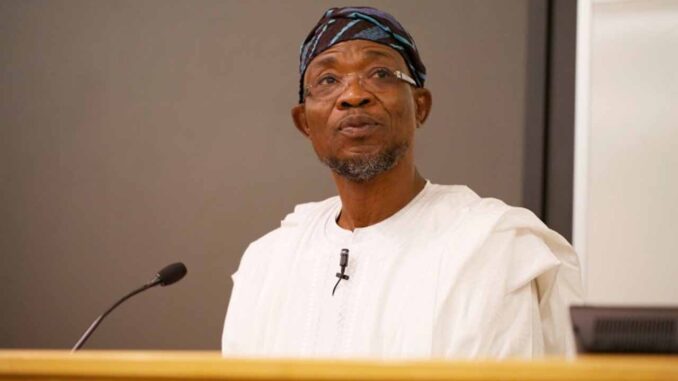
The Federal Government’s unveiling of a five-year strategic plan to boost internal security, in the twilight of President Muhammadu Buhari-led administration, verges on the side of ridicule, if not an abuse of executive powers. While government is meant to be a continuum, the outgoing administration has demonstrated less than stellar competence to worth one that bequeaths direction for the post-Buhari era. Hence, the so-called strategic plan for internal security should end with Buhari and his cabinet.
According to the Minister of Interior, Rauf Aregbesola, “the strategic plan provides directions for both long and short term plans as well as analyse current internal security situations in Nigeria, looks into daily security challenges as well as the overall security architecture and national security policies.” The key pillars of the plan are safety and security, provision of internal security, citizenship integrity, transparency, and service delivery.
The idea was conceived at the second Ministerial Strategy Retreat held by the Interior Ministry in Ilorin, Kwara State, in 2021. The Retreat had resolved to develop a strategic plan that would serve as a guide for all the programmes, projects, and policies of the Ministry, its services, and Board in attaining its overall ministerial mandate of fostering the maintenance of internal security and citizenship integrity for the promotion of good governance. The plan would be implemented through the agencies of the Ministry, viz: the Nigeria Security and Civil Defence Corps (NSCDC), the Nigeria Immigration Service (NIS), Nigerian Correctional Service (NCoS), and the Federal Fire Service (FFS).
Admittedly, internal security is pivotal to the stability, growth, development, and prosperity of any society, as no nation can evolve amid chaos and anarchy. This explains why the Nigerian grundnorm places security at the fore of governance. Therefore, any strategy that seeks to further improve our security structure and tackle rising threats should be endorsed. However, the strategic plan rolled out by the Interior Minister is an ad hoc arrangement that lacks substance and institutional framework.
The entire proposal is sketchy, narrow-scoped, and contains too many gaps. Aregbesola merely enumerated the statutory duties of the agencies under his purview but failed to state what each would be doing differently to achieve the set objectives. For instance, it is not clear how the plan will be integrated into the usual activities of the respective agencies. Will a separate department be created in each agency? Who will coordinate, superintend or oversee the implementation of the plan or will the agencies be working independently? How will the plan be financed? The Minster failed to show any inter-operational enforcement machinery that will synergise the operations of the agencies. Additionally, no new strategy was disclosed as each agency will simply be carrying on with its usual business. Curiously, the supposed strategic plan completely sidelined other key security players.
Indeed, the task of securing the lives and property of the people while at the same time maintaining law and order is herculean. Undoubtedly, national security is too complex and encompassing to be exclusively handled by the Interior Ministry. Also, considering the intertwining complexion of national security and national defence, any internal security plan that excludes the input of the military may likely prove counterproductive. Furthermore, the NSCDC, which only plays a complementary role in combating crime and intelligence gathering, cannot effectively implement the security plan without collaborating with the Nigeria Police Force. In the same vein, the NIS cannot proactively and efficiently monitor our borders in isolation from the Nigerian Customs Service. Accordingly, the Minister ought to have widely consulted with the core security agencies before crafting the strategic plan.
Very importantly, the timing of the plan is quite suspicious. It begs the question that the present government intends to launch a long term plan (which had been in the pipeline for about two years) at the twilight of its administration. The Interior Minister is apparently laying the groundwork for his successor-in-office (even when there is no guarantee that the latter will share his sentiments) since he obviously cannot see the plan to the end. It can also be argued that the idea is a mere academic exercise considering that no practical action has been taken since the plan was announced. That it is coming onboard now is a sheer waste of time and resources.
Instead of dissipating energy on a venture that has no future, the Honourable Minister should be rendering account of his stewardship at this time. There had been a series of attacks and jailbreaks at the Nigerian Correctional Facility and most of the escapees are still walking freely. The Minister ought to be addressing the nation on the measures he has put in place to fortify the ‘prisons’ to prevent, avert and or intercept subsequent attacks. Also, he should be seen to be redressing the inefficiency of the NIS as per its expatriate quota abuses and international passport issuance/renewal delay.
It is amusing that the outgoing administration has been churning out various national plans on the eve of its departure. These actions together with the postponement of the national census and subsidy removal after the presidential inauguration ceremony are simply agenda-setting for the next government. It is hypocritical for a government that failed to deliver on its manifestoes to constitute itself as the think tank of the incoming administration.
Sadly, President Muhammadu Buhari’s much-touted integrity and anti-corruption toga turned out to be a hoax. Not only is the current administration the most corrupt in the history of the country, the few ex-governors that the Economic and Financial Crimes Commission successfully convicted on corruption charges were unapologetically pardoned by the President. Most recently, the Attorney-General of the Federation terminated the N1.84 billion corruption charges filed against Nicholas Ashinze, a former military assistant to the then National Security Adviser (NSA), Sambo Dasuki, without adducing any reason! Consequently, the Presidency should quit this last-minute self-serving activism disguised as national plans, and rather, adorn itself in sack clothes and ashes begging for mercy having utterly failed Nigerians!
END

Be the first to comment